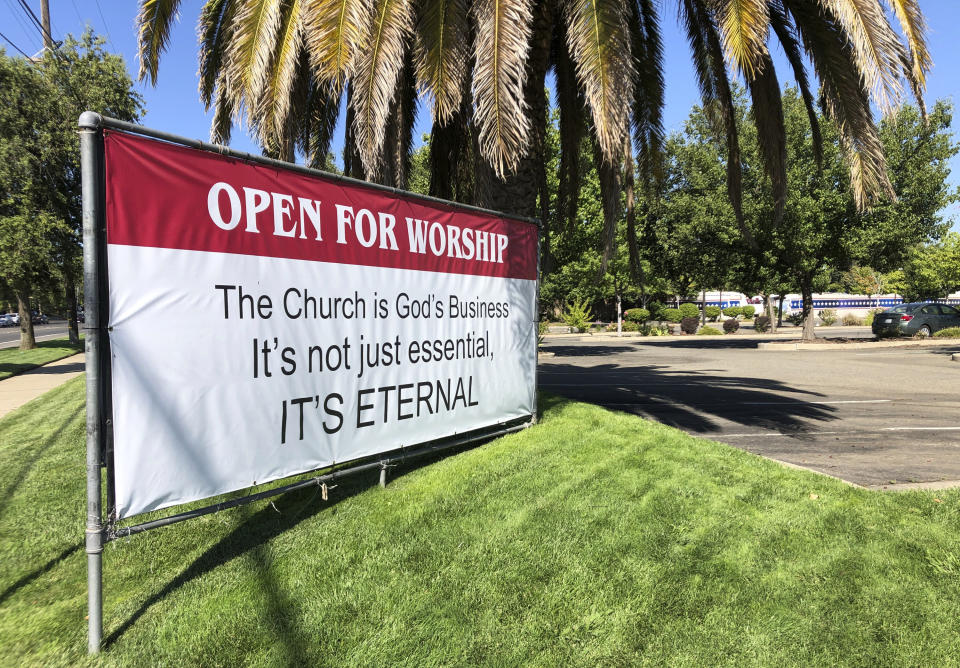Even White Evangelicals Don't Think Churches Should Be Exempt From Virus Restrictions
Conservative Christian activists have pushed state and local authorities for months to allow houses of worship to reopen on their own terms during the coronavirus pandemic. But a new survey from the Pew Research Center suggests that most Americans ― including evangelicals ― believe houses of worship shouldn’t get special treatment.
About eight in 10 Americans surveyed by Pew (79%) said that houses of worship should be required to follow the same rules about social distancing and large gatherings as other organizations or businesses in their local area, according to a report published Friday. Evangelical Protestants were most likely to say the opposite ― that houses of worship should be given more flexibility. But even among this religious group, the majority (62%) believed that houses of worship should be held to the same standard as businesses.
Narrowing the data down even further, the majority of white evangelical Protestant respondents (59%) said that churches should be required to follow the same rules as other establishments in their local area, according to an analysis Pew conducted for HuffPost.
The statistics suggest that, even as some evangelical pastors claim coronavirus restrictions are violating congregants’ religious liberty, many Americans of faith believe authorities do have the right to tell congregations how to worship during a global health crisis.

Most states already have rules in place exempting houses of worship from social distancing orders. Still, defending the ability of houses of worship to meet in person during the pandemic has become a key concern for the conservative Christian legal movement, which seeks to advance and protect conservative religious values primarily through legal advocacy. The law firms that spearhead this movement have stepped in on numerous occasions over the past few months to rally and defend churches that want to flout local or state coronavirus restrictions. With the help of these legal groups, religious leaders ― mostly evangelicals ― have filed lawsuits pushing authorities to loosen restrictions on houses of worship.
So far, their efforts haven’t fared well in front of the Supreme Court. A narrowly divided Court has already rejected two requests from churches ― one in Nevada and another in California ― who claimed state coronavirus restrictions were violating their religious liberty.
President Donald Trump’s administration has also stepped in to defend churches’ ability to meet in person during the pandemic. In May, Trump decried the fact that “liquor stores and abortion clinics” were deemed essential in some places while churches were not, and threatened to “override” governors who didn’t allow churches to reopen.
One of the key sore spots in the debate about reopening churches is what businesses houses of worship should be compared to when assessing safety risks ― if they are more similar to grocery stores or to live theater, for example. Health experts agree that given the high-risk activities that typically take place during services ― such as singing and loud talking ― houses of worship are more similar to gatherings like concerts.
Pew’s survey question about whether houses of worship should follow the same rules as businesses did not address what kinds of gatherings respondents should be thinking about.

The survey of 10,211 adults, conducted between July 13 and July 19, suggested that even though Americans have the option to attend services in some places, most people of faith are not ready to go back to life as usual.
Among Americans who attend services at least monthly ― whom Pew categorized as “regular” worshippers ― only 33% said they have attended in person within the last month. White evangelicals who were regular attendees were more likely than other religious groups to say they have attended services in person (46%). Overall, most regular attendees (72%) decided to tune in online or on television.
Only 6% of regular attendees said their congregation was open and operating as it was before the pandemic. Most said their congregations had opened with modifications (55%). White evangelicals (71%) and white Catholics (79%) were most likely to say that their congregation was open with modifications. Black Protestants were most likely to say that their congregations were not open for in-person religious services (45%).

Regular attendees’ responses suggested that some commonly recommended measures to stop the virus from spreading aren’t particularly popular at reopened houses of worship. Only 45% of regular attendees who said their house of worship had opened with modifications said that their congregation was requiring people to practice social distancing. About 35% of that group said that they were required to wear masks. Only 20% said there were limits on communal singing ― which experts say is a particularly effective way for the virus to spread.
Pew found that many regular attendees want their houses of worship to implement stronger requirements for attendance. Members of this group think their congregations should require people to socially distance (51%), wear masks (44%), and limit or prohibit communal singing (29%).
About 31% of all regular attendees said their houses of worship were still closed.
Love HuffPost? Become a founding member of HuffPost Plus today.
A HuffPost Guide To Coronavirus
Stay up to date with our live blog as we cover the COVID-19 pandemic
7 essential pieces of relationship advice for couples in quarantine
What you need to know about face masks right now
How to tell if you need to start doing online therapy
Lost your job due to coronavirus? Here’s what you need to know.
Parenting during the coronavirus crisis?
What coronavirus questions are on your mind right now? We want to help you find answers.
Everyone deserves accurate information about COVID-19. Support journalism without a paywall — and keep it free for everyone — by becoming a HuffPost member today.
This article originally appeared on HuffPost and has been updated.

 Yahoo News
Yahoo News 